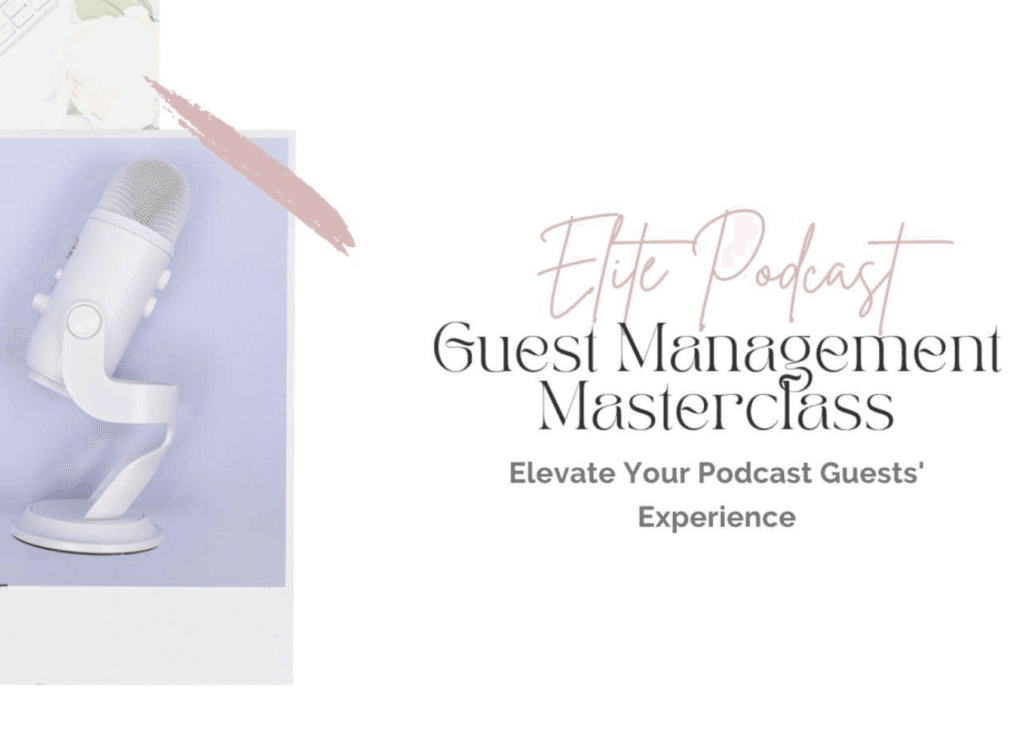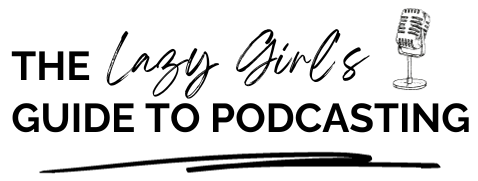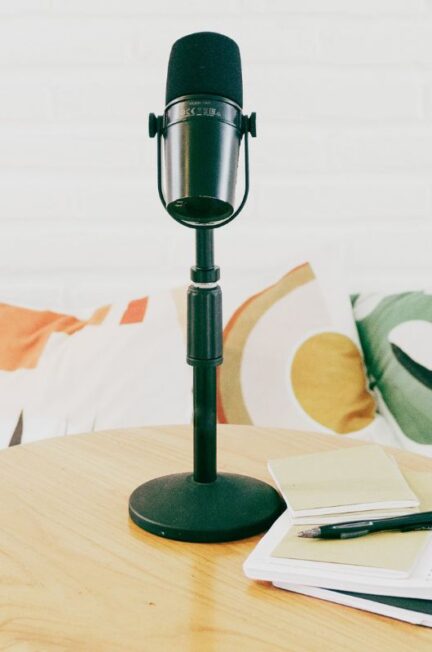This post may contain affiliate links. If you click on an affiliate link and make a purchase, I may earn a small commission at no additional cost to you. For more information, see our Privacy Policy.
Podcast guesting seems to be the new big thing in terms of promoting your services, and products, and establishing yourself as an authority in your niche. But if you’ve never guested on a podcast before, you might quickly find yourself Googling ‘How to be a podcast guest.’
In fact, how to be a good podcast guest was something I got asked in a recent presentation that I did to a Facebook Group of business professionals. And as someone who has guested on a fair few podcasts and interviewed my share of podcast guests, it’s a topic that I love talking about.
But before we dive into the pros and cons, how to prepare for your podcast interview, tips for during the interview, and guesting follow-up, let’s dive into why being a podcast guest could be a smart move for you.
Podcasting is a hugely engaging and intimate medium that allows listeners to tune in to their favourite shows and follow along with the latest news, trends, and topics in a certain niche.
The rise of podcasting has also brought with it a new opportunity for individuals to share their knowledge and expertise with a wider audience – guesting on a podcast. Guesting on a podcast involves appearing as a guest on someone else’s podcast to offer insights, add value, and share your expertise with their listeners.
It’s a valuable opportunity for anyone looking to expand their network, build authority, and gain exposure in their niche. Whether you’re an entrepreneur, author, or influencer, guesting on a podcast can help you connect with new listeners, showcase your personality, and make an impact in your industry. It can also help you reach a broader audience, build your reputation, and establish credibility in your niche.
On the other hand, it requires a significant time investment, plus, the work doesn’t end when the recording finishes. And so, as with any type of media appearance, it’s essential to weigh the advantages and drawbacks before committing to guesting on a podcast.
In this article, we’ll take a closer look at the pros and cons of guesting on a podcast, provide tips for preparing before the interview, discuss strategies for being a great guest during the interview, and offer advice for following up and promoting the episode after it’s been released.
Pros and cons of being a podcast guest
There are so many reasons to be a podcast guest. But, for most people, guesting on a podcast is a way of building their brand, growing their authority, and getting in front of a new audience.
So, let’s dive into these pros a little further:
Guesting on a podcast provides exposure
Being a podcast guest is an awesome opportunity to showcase your personality, skills, and knowledge to an audience that is likely interested in what you have to say.
Your appearance on a podcast could also bring new listeners to your own platform (i.e., your own podcast!), expanding your reach.
Guesting on a podcast can help with networking
As they say, it’s not just what you know, it’s who you know.
Being on a podcast can put you in contact with other guests, the host, and potentially even a community of listeners who share your interests. I’ve made some brilliant connections through podcasting, including:
- Friends
- Business leads (i.e. clients!)
- Guest opportunities for other podcasts/Facebook Groups
Guesting on a podcast can help build authority
When you share your knowledge and expertise, you become a valuable resource in the eyes of your audience.
Establishing yourself as an authority in your field can lead to future opportunities, such as speaking engagements or collaborations.
Guesting on a podcast requires your time
Of course, there are also cons to consider when guesting on a podcast and one major drawback is the time investment required.
Majoy time-sucking aspects of being a podcast guest include:
- Researching the podcast
- Preparing talking points
- Participating in the interview
This can all be time-consuming, especially if you are busy running your own business, podcast, or working full-time; in fact, just anything that fills up your day.
Another con could be the risk of negative exposure
While the benefits of podcasting can be great, it’s important to remember that you are in a very public forum.
If you aren’t careful with your message, tone, or delivery, you could inadvertently put yourself in a negative light.
Preparing to be a podcast guest
Preparing for a podcast interview might seem like a daunting task, but it doesn’t have to be. The key is to be sufficiently prepared to ensure that you are able to deliver your message seamlessly on air.
Here are my top tips to help you prepare to be a guest on someone else’s show:
Give the podcast host the information they need
Often, you’ll be asked to provide some information before you guest on a podcast. This can include anything from your professional bio, how to pronounce your surname, links for listeners to contact you, your favourite ice cream, a question for the next guest…
Regardless of what you’ve been asked to provide, make sure that you give the information asked of you, and in good time. It’s very challenging as a podcast host to be chasing information from a podcast guest (and if this is you, check out the Elite Onboarding Masterclass – it’ll transform how you collect all the information you need from your podcast guests).

As a guest, when providing your bio, think about what’s relevant.
Does the host need to know what your university course was that you dropped out of? Do they need to know about that kid who bullied you in year 5 at school? If the info isn’t relevant to what you’ll be talking about on the podcast, leave it out.
Listeners tune into a podcast episode to learn or be entertained in some way from the podcast content. They aren’t turning up to hear your life history read out by the podcast host and will probably switch off before they get to the good stuff in your interview.
Research the podcast and its host
It is SO obvious when you’re interviewing a guest who has no idea what your show is about, who you are, and who your audience is.
I’m not saying that you have to listen to every podcast episode that the podcast has ever published and research every inch of a host’s social media first, but you do need to have an idea of the podcast and who will be interviewing you before the record button is pressed.
Before agreeing to be a guest on a podcast, take your time to listen to a few episodes to familiarise yourself with the host’s style and topics. Is it a casual conversation? Is it a more formal question-and-answer style? Is there an overarching talking point?
This will provide you with insight into the format of the show, the guests who have been interviewed before, plus the type of audience the podcast attracts.
You can also read the podcast’s website, check out their social media pages, and follow the host on their personal accounts to get a better understanding of their interests and how they engage with their audience. This research will help you tailor your message to resonate with the host and their audience.
Define your main message and prepare talking points
In short, know what it is that you want to bring to the conversation on the podcast.
And I don’t mean in an overly sales-y way. I mean your message. What value can you provide to the podcast through your expertise and experiences? But on the note of sales, ask the host if they mind you plugging your latest Masterclass or freebie.
On the note of selling your wares, I would leave this until the end of the episode. You don’t want to get a reputation for being the guest who is constantly trying to sell something to other people’s podcast audiences. Remember: people buy from people. People are more likely to engage with you and your products/services if they get to know you first rather than having what you’re selling shoved down their throats.
To communicate your message effectively, you need to define the key points that you want to highlight during the interview. This will help you stay focused and provide answers to the host’s questions that are relevant. It’s also important to anticipate any challenging questions that may arise and prepare appropriate responses. And if there are any topics you’d rather not discuss; tell the podcast host before you start recording.
[Side note: In my podcast guest release form, I actually have a question asking if there are any topics the guest would prefer not to be asked about or talked about. Whilst this isn’t necessary, I like this addition as I feel it helps guests be at ease knowing that a topic they don’t like talking about won’t come up if I already know about it.]
While it’s essential to prepare, don’t over-prepare to the point of sounding scripted or robotic. You should still sound natural and engaging during the conversation.
Test your equipment and internet connection
Technical glitches during a podcast interview can be a nightmare. I know, I’ve been there! Including times when my guest’s Wi-Fi has cut out, the recording randomly got scrambled and we had to stop and start again, to a guest not knowing how to work the recording platform that I was using.
You can avoid potential problems like these in a variety of ways:
- Test your audio equipment, microphone, and internet connection before the interview. It sounds silly, but just check that there isn’t maintenance on your internet that day that’ll mean your call gets cut out (yes, that’s happened to me before!).
- Prepare your environment and try and be in a quiet room with minimal background noise. Some podcasters (myself included) don’t mind if a child, baby, or pet is present. But other podcasters prefer the room that you’re recording in to be completely silent. It might be worth checking with the podcaster whose show you’re appearing on first to see which camp they sit in.
- If you can, get a proper microphone for your interviews. If this is your first interview, or you don’t plan on doing many podcast interviews, then you might want to stick with your built-in microphone on your laptop/desktop, or even use the microphone built into your headphones. However, if you plan on doing multiple podcast interviews, or even starting your own podcast, then I’d recommend upgrading to a USB microphone to enhance your audio input. (And if you’re looking for a relatively in-expensive podcasting mic recommendation, I love the Blue Yeti Microphone, available from Amazon).
- If possible, use headphones to avoid echo or feedback that may occur if the audio is playing through speakers. Plug-in headphones are better than wireless, simply because there isn’t the risk of poor connection or dying batteries. But, if you choose to use AirPods (or similar) ensure that they are fully charged and connected properly before you start.
During the podcast interview
Now that you’ve done your research, practised your talking points, and prepared your equipment, it’s time to show the host and their audience what you’ve got.
Here are some tips for being a great guest during the podcast interview:
Respect the host and their audience
Let’s start with the basics: You’re a guest on someone else’s show, so it’s important to show some respect.
Please don’t interrupt the host or talk over them. Don’t check your phone or fidget around while they’re speaking. And don’t use the interview as an opportunity to promote yourself excessively.
Remember, it’s their show, not yours.
Stay on topic and answer the questions
When the host asks you a question, make sure you listen carefully and answer it fully.
Avoid going off on tangents or talking too much about yourself. If the host wants to know more about your experience or background, they’ll ask. And if you’re not sure what they’re asking, don’t be afraid to clarify.
Be enthusiastic and engaging
Podcasts are all about personality and connection. So don’t be afraid to let your personality shine through.
Be enthusiastic and engaging, and show the host and their audience that you’re passionate about the topic you’re discussing. Smile, laugh, and be yourself.
Share your expertise and add value
As a guest, your job is to provide value to the host and their audience. So make sure you’re sharing your expertise and knowledge as much as possible.
Think about what unique insights or perspectives you can bring to the conversation. And if you can provide tips or advice that the audience can use, even better.
Provide clear calls-to-action
Finally, don’t forget to provide clear calls to action at the end of the interview. Whether it’s directing listeners to your website or social media profiles, offering a free ebook or resource, or simply encouraging them to reach out to you with questions or comments, make sure you’re giving them a clear next step.
Following up and promoting the episode
Woop woop!
You crushed your podcast interview and provided valuable insights to the audience. But don’t relax just yet as there are still some critical steps you need to take post-interview to maximise the impact of your appearance.
First things first, you need to thank the host for providing the platform and inviting you to speak. A quick email or message expressing your gratitude and appreciation can go a long way in building a long-lasting relationship. And while you’re at it, don’t forget to share the episode on your social media profiles. Not only will it provide exposure to your brand, but it will also show the host that you’re willing to promote their podcast.
But your job as a guest doesn’t end with a simple thank you note and social media promotion. You need to engage with the audience and other guests who appeared on the episode. Respond to comments and messages you receive, and provide additional clarifications or insights. By doing so, you can establish yourself as a thought leader in your industry and build credibility.
Now, here comes the difficult part – analysing your performance. Yes; I want you to listen to your episode with a critical ear.
Why?
Because it’s essential to review your appearance to understand what worked and what could be improved in future interviews.
Take note of your talking points, delivery style, and overall flow of the interview. Also, don’t shy away from seeking feedback from the host on how you can improve as a guest. In fact, if this is one of your first podcast interviews, ask for feedback from the host if you want it. Ask them if they have any pointers for guesting in the future based on this interview. You never know what tips and tricks they could teach you!
Conclusion
We’ve covered a tone in this post, and hopefully, you’ve found it helpful in preparing you on how to be a podcast guest.
Remember, guesting on a podcast has the potential to expose you to a wider audience, network with like-minded individuals, and establish yourself as an expert in your field. But it does require a time investment and there is a possibility for negative exposure.
In conclusion, always be respectful, and engaging, and provide value to both the host and their audience. Don’t be afraid to share your expertise and clear calls to action. Follow up and promote the episode to maximise its impact, reach and return on investment for your time.
Above all, have fun and enjoy the experience!
What do you think? Did I miss anything? Let me know in the comments!





